 Petzlover
Petzlover Slovak Cuvac is originated from Slovakia but Stabyhoun is originated from Denmark. Slovak Cuvac may grow 17 cm / 7 inches higher than Stabyhoun. Slovak Cuvac may weigh 6 kg / 13 pounds lesser than Stabyhoun. Both Slovak Cuvac and Stabyhoun has almost same life span. Both Slovak Cuvac and Stabyhoun has almost same litter size. Slovak Cuvac requires Moderate Maintenance. But Stabyhoun requires Low Maintenance
Slovak Cuvac is originated from Slovakia but Stabyhoun is originated from Denmark. Slovak Cuvac may grow 17 cm / 7 inches higher than Stabyhoun. Slovak Cuvac may weigh 6 kg / 13 pounds lesser than Stabyhoun. Both Slovak Cuvac and Stabyhoun has almost same life span. Both Slovak Cuvac and Stabyhoun has almost same litter size. Slovak Cuvac requires Moderate Maintenance. But Stabyhoun requires Low Maintenance
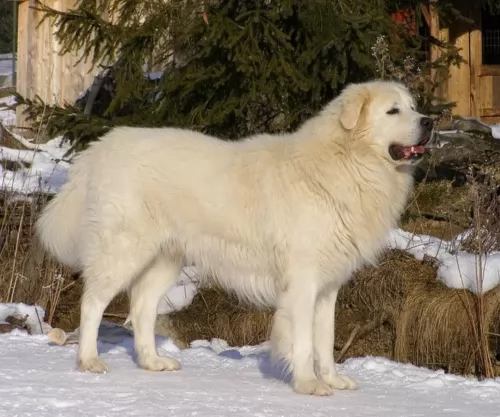 Looking quite a bit like the Pyrenean Mountain Dog, the Slovak Cuvac is a large dog that has served as a guard dog. The Slovensky Cuvac is still used on sheep farms as he isn’t afraid of wolves and bears and will take them on if needs be.
Looking quite a bit like the Pyrenean Mountain Dog, the Slovak Cuvac is a large dog that has served as a guard dog. The Slovensky Cuvac is still used on sheep farms as he isn’t afraid of wolves and bears and will take them on if needs be.
Records of this dog have been kept since the 17th century already, and when the breed started dying out, a certain Dr Antonin Hruza put in efforts to revive the dog.
The registered breeding of the Slovensky Cuvac was established in Czechoslovakia and a club for the dog was established in 1933. A written standard was established in 1964. The dog is not recognized by the Fédération Cynologique Internationale.
 The Stabyhoun is a near extinct breed and one of the rarest ever. He was never recognized by the major kennel clubs but was entered into Foundation Stock Services.. The breed comes from the Netherlands in the Frisian Forest and has been known since the early nineteenth century.
The Stabyhoun is a near extinct breed and one of the rarest ever. He was never recognized by the major kennel clubs but was entered into Foundation Stock Services.. The breed comes from the Netherlands in the Frisian Forest and has been known since the early nineteenth century.
It was not known outside of the Friesland Forest area until the 1960’s and outside the Netherlands only since the twenty first century. The Stabyhoun is a Dutch national treasure whose name means “stand by me dog”. Today throughout the world only a few thousand remain.
The Stabyhoun is hunter and retriever with a soft-mouth and ability to point. He was used for duck hunting and finding upland birds. He is great in the water, sharp-eyes and efficient, he works quickly. The breed has also been known to hunt fox, other birds and small game. They are great at catching moles.
Even though British breeds are more popular for hunting now, the Stabij remains an excellent all round hunter. He can track, point, and retrieve. He is also a good watchdog though his disposition is peaceful and gentle. They needed to be general all around farm dogs as farmers could only afford one dog.
They have not changed much since the 1800’s either in function or appearance. In order to get such a gentle working dog, they early Stabyhoun has been mixed with the much older and rarer breed from the same area, the Wetterhoun. This crossbreeding was stopped in 1942 in order to gain breed recognition and hope to keep either of these two rare breeds from extinction.
Today the number of Stabyhoun in the Netherlands, the United Kingdom, North America and Scandinavia are slowly but surely increasing. He is highly prized as an independent thinker and hunter, inquisitive and gentle. They are related to the Heidewachtel and the Drentsche Patrijshound.
The first Staby born in the U.S. was around 1994 and in 2017 there were thought to be over 7000 Stabyhouns in the world. They are much more popular now in Europe and North America.
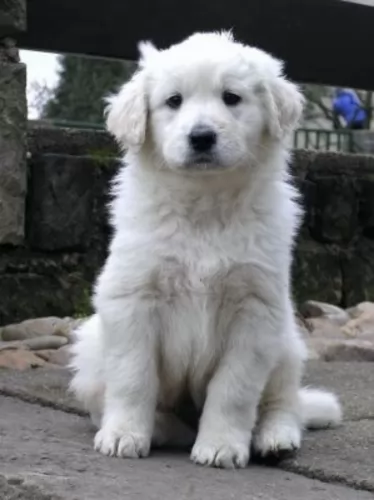 This is a large dog standing at between 59 and 70cm in height and weighing between 31 and 44kg.
This is a large dog standing at between 59 and 70cm in height and weighing between 31 and 44kg.
The neck is broad and has quite a bit of fur around it. The head is large, the eyes dark brown, the double coat is white and thick and medium length. The eyes are brown, the ears medium length and floppy and the tail long and furry.
This is a robust dog, used to spending time outdoors keeping watch over livestock. When he is invited into the home, he is gentle and well behaved, more so when he has been trained and socialized.
He is loving and loyal towards his human family and will get on well with children in the home. He isn’t the brightest dog but you can still have him trained.
 The Staby are powerful soft-mouthed pointers who are not too fine or too robust with tightly fitting skin. Their chest, legs, collar and tail are feathered and make the dog look like a longhaired canine, but she really is not. The dog is longer than it is tall, and his head is longer than it is wide. Most of the breed are black and white but there are many brown and white, while the orange and white are very close to extinction.
The Staby are powerful soft-mouthed pointers who are not too fine or too robust with tightly fitting skin. Their chest, legs, collar and tail are feathered and make the dog look like a longhaired canine, but she really is not. The dog is longer than it is tall, and his head is longer than it is wide. Most of the breed are black and white but there are many brown and white, while the orange and white are very close to extinction.
They have a slightly domed skull and a slightly arched but strong neck. Their muzzle is broad and the bridge straight while the nose is well developed. With medium sized ears, set low on the head and having the bottom third of the ears covered with hair. The eyes are round, medium sized and level in the head
They have a long sleek coat with a slightly wavy croup. They are never curly. Its back is straight, tail long and loin powerful.
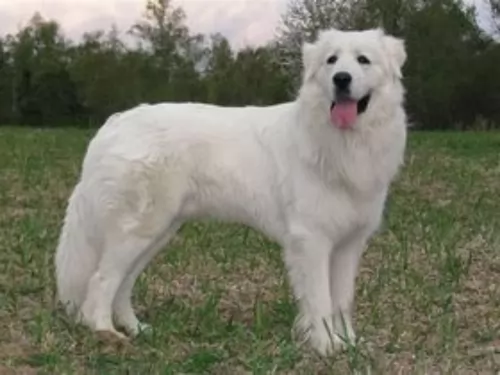 Your playful Slovak Cuvac is an affectionate dog, wanting nothing more than to be totally involved in his family’s life.
Your playful Slovak Cuvac is an affectionate dog, wanting nothing more than to be totally involved in his family’s life.
He is social and loving and also makes an excellent watchdog. He’s a big dog so think carefully before you bring him into your home. Many dog owners like the look of a big dog and forget that it costs a lot of money to feed a big dog and to pay for vet fees.
This big dog is wanting to be part of your family and not just to be discarded when you find that he is costing you too much.
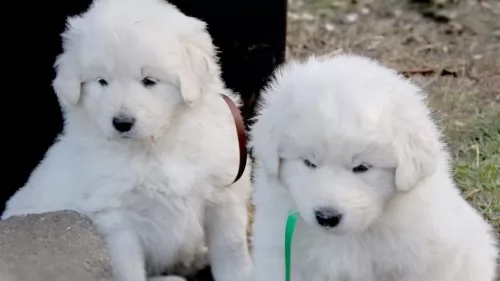 This is a healthy dog breed, but as with many large dogs, hip dysplasia is a threat. Hip dysplasia is always reason for concern as the condition can reduce a dog’s quality of life.
This is a healthy dog breed, but as with many large dogs, hip dysplasia is a threat. Hip dysplasia is always reason for concern as the condition can reduce a dog’s quality of life.
It is distressing seeing your once active pet becoming reluctant to play and move around.
Canine hip dysplasia is a common skeletal condition. It can strike any size dog but is more prevalent with large dogs. The ball and socket of the hip doesn’t fit properly and deterioration sets in resulting in loss of function of the joint.
You will need to get your dog to the vet who will perform a physical exam and discuss treatments to alleviate the pain your dog can experience.
 Though an isolated, rare breed for so long, the Stabyhoun does have several known health issues including:
Though an isolated, rare breed for so long, the Stabyhoun does have several known health issues including:
• PDA or Patient Ductus Arteriosis – heart issue from 6 weeks on. Major vessel does not close. With surgery it can be corrected.
• Type 1 von Willebrand’s Disease (vWB) – a bleeding disorder in its mildest form. DNA testing is available not required.
• Cerebral dysfunction – rare compulsive behavior at 6 weeks. It is fatal at this point. DNA testing will be required.
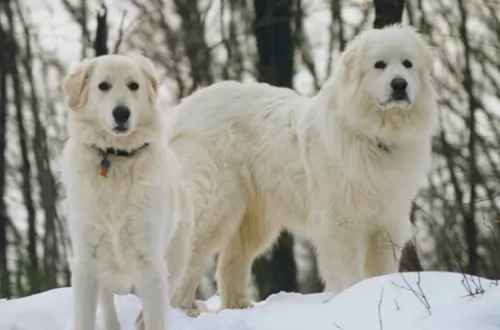 ◆The thick white hair will require regular grooming to keep it free from burrs and dirt. He sheds so this brushing will help him to look more groomed.
◆The thick white hair will require regular grooming to keep it free from burrs and dirt. He sheds so this brushing will help him to look more groomed.
◆The nails should be trimmed regularly and the ears too should be checked for redness and infection. You’ll need to look inside his mouth too as a rotting tooth can cause havoc within his body. A rotten tooth can also cause him tremendous pain and he has no way of telling you this.
◆Have your pet spayed or neutered if you don’t want any puppies. This is better for your dog’s health in the long run too.
◆Your Slovak Cuvac is going to need a lot of exercise as they have always been used to roaming the mountains watching over livestock.
◆This is a big dog so if you buy commercially manufactured food, make sure its for large, energetic dogs. There are good commercially manufactured dog foods on the market – just make sure you buy the best one for your pet to enhance health and longevity.
Try and give him some home made food too. Healthy food which won’t jeopardise his digestion is boiled chicken, brown rice or pasta and spinach, sweet potatoes and carrots. These can all be chopped up and small portions mixed into the dry kibble twice a week as a treat.
Try and include some raw meat occasionally. Your dog will thank you for not giving him exotic people foods which can do lots of harm. Ensure there is always a bowl of fresh, cool water within his reach.
 1Feeding the puppy -They are prone to obesity. Do not overfeed. Watch calories. Feed a high quality dog food meant for active medium sized dogs in 3-4 meals per day.
1Feeding the puppy -They are prone to obesity. Do not overfeed. Watch calories. Feed a high quality dog food meant for active medium sized dogs in 3-4 meals per day.
2.Feeding the adult – Feed a high quality dog for medium sized dogs in 2-3 meals per day.
An active dog that needs exercise. They need mental stimulation as much or more than they need physical. Don’t skimp on either. They love agility, field trials, lure coursing, and scent training. They also love the triathlon, frisbee and endurance.